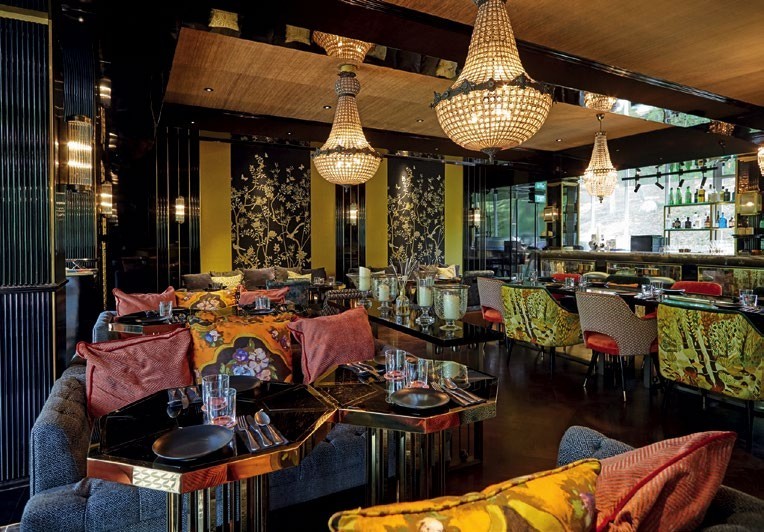To entice the next generation of luxury-home buyers, Thai property developer Sansiri is rolling out exceptional lifestyle experiences.


Apichart Chutrakul knows a good thing when he sees it. “Dempsey is an upand-coming place to be at, if you haven’t been here, you’re a bit lacking,” says the chief executive officer of Thai property developer Sansiri.
The 58-year-old, whose company has spearheaded some of Thailand’s most coveted luxury residences, such as 98 Wireless and the upcoming Khun By Yoo condominium, is particularly impressed by the Como Dempsey lifestyle complex, which houses multilabel boutique Dover Street Market and a Jean-Georges Vongerichten restaurant.
Sansiri, too, has been contributing to the buzz, with the January launch of its first Siri House, a 3,000 sq ft dining, retail and social space that overlooks Dempsey Hill’s lush greenery. It is the 35-year-old company’s latest push to showcase the “lifestyle that we offer”, particularly to the all-important potential international clientele of its luxury residential condos in Thailand.
Chutrakul, who helped launch Sansiri, his family’s real estate company in 1984, has overseen the company’s rise and fall, and rise again, over the decades, including during the financial crisis of 1997, where the company underwent a difficult restructuring before bouncing back. Last year, Sansiri achieved record sales of 48,500 billion baht (S$2 trillion), the best in its history, representing a 25 per cent year-on-year growth.
For the last five years, Sansiri has been the Thai real estate developer with the highest sales in international markets, underscoring the importance of overseas buyers to its bottom line.
“Singapore is a hub in South-east Asia, not just for Singaporeans, but also for foreigners, so it is a natural touchpoint for us,” Chutrakul says, noting that Singapore is Sansiri’s third biggest market in international sales after China and Hong Kong. The company launched a second Siri House in Bangkok in March; more global outposts will follow.
DESIGNER LIFESTYLE
The luxury set, he observes, is no longer interested in buying indiscriminately. “Today, buying is not a problem, but at the end of the day, people favour unique, different experiences over buying stuff .”
This is why guests at Siri House can wine and dine, admire art at the gallery space, and browse a capsule collection of products by Thai designers. These experiences may perhaps also inspire them to view a “showflat” featuring Sansiri’s latest developments.
Currently on display at Siri House’s sales gallery is The Monument, a flagship luxury property in Bangkok’s hip Thong Lo district. “Thong Lo is the Soho of Thailand. The food, dining, nightlife – everything happens here,” he says.
Designed by Quintrix, a top Bangkok architectural firm, four of the 127 units in the 45-storey development are also furnished by top global interior designers, including Gert Voorjans from Belgium, Lorenzo Castillo from Spain and Hutton Wilkinson from Los Angeles.
“Our aim is to bring some of the world’s most renowned designers and architects to our customers. To hire them for an individual project would cost an arm and a leg, but, through Sansiri, we can do multiple projects and bring them to the world,” he says.
A GOOD DEAL
Thailand’s property market has been booming in the past three years, with mainland Chinese spending roughly US$10 billion (S$13.7 billion) on Thai condos. Japanese and Singaporean buyers have spent US$8 billion and US$2 billion respectively. This has contributed to the 20 per cent increase in property prices in major Thai cities. Nevertheless, Chutrakul believes that Singaporeans will continue to view Thai property as a good deal, whether as a second home or for investments. For example, units at The Monument cost about $1,300 per sq ft, while in Singapore, prices for superluxury condominiums typically start from $3,500 per sq ft.
THE SIMPLE LIFE
A self-professed man of simple tastes, Chutrakul prefers dressing down and dining at local Thai eateries. He is dismissive of international food guides, saying: “When they say Michelin star, the Thais say, ‘What’s this?’ Everyone has their own guide.” He once took a friend from New York to east ThaiChinese roast goose at a street eatery. “He said it was the best goose he had ever eaten,” says Chutrakul. “But to enjoy it, you have to sit in a hot shop and tolerate tuk tuks driving by.”
Still, he is aware that today’s consumers want luxury experiences. So, Sansiri’s some 3,000 staff are his eyes and ears. “We embrace the younger generation’s lifestyle and we push our staff to experience this – especially when they travel – and bring these ideas back to Sansiri,” he says.
Next up, the company is banking on millennials’ obsession with health and wellness. This month, Sansiri is launching a wellness-themed condo in Bangkok featuring medically trained staff, a partnership with a virtual hospital, and fitness programmes for residents. “The young are spending more on their wellness so that their health-care expenses will be lower when they age,” he says.

CAPTIVE AUDIENCE
Multi-concept establishment Sansiri House, led by CEO Apichart Chutrakul (opposite), offers fine food, artworks, products by Thai designers, and a glimpse of Sansiri homes.























